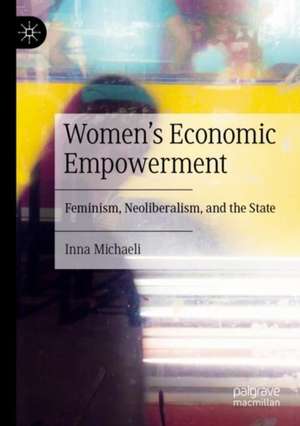Women's Economic Empowerment: Feminism, Neoliberalism, and the State
Autor Inna Michaelien Limba Engleză Paperback – 5 ian 2023
This book is based on the author’s doctoral dissertation at the Humboldt University of Berlin, Faculty of Humanities and Social Sciences.
| Toate formatele și edițiile | Preț | Express |
|---|---|---|
| Paperback (1) | 689.79 lei 6-8 săpt. | |
| Springer International Publishing – 5 ian 2023 | 689.79 lei 6-8 săpt. | |
| Hardback (1) | 695.01 lei 6-8 săpt. | |
| Springer International Publishing – 4 ian 2022 | 695.01 lei 6-8 săpt. |
Preț: 689.79 lei
Preț vechi: 811.51 lei
-15% Nou
Puncte Express: 1035
Preț estimativ în valută:
131.99€ • 138.18$ • 109.21£
131.99€ • 138.18$ • 109.21£
Carte tipărită la comandă
Livrare economică 05-19 aprilie
Preluare comenzi: 021 569.72.76
Specificații
ISBN-13: 9783030892838
ISBN-10: 3030892832
Ilustrații: XIII, 164 p.
Dimensiuni: 148 x 210 mm
Greutate: 0.22 kg
Ediția:1st ed. 2021
Editura: Springer International Publishing
Colecția Palgrave Macmillan
Locul publicării:Cham, Switzerland
ISBN-10: 3030892832
Ilustrații: XIII, 164 p.
Dimensiuni: 148 x 210 mm
Greutate: 0.22 kg
Ediția:1st ed. 2021
Editura: Springer International Publishing
Colecția Palgrave Macmillan
Locul publicării:Cham, Switzerland
Cuprins
1.Introduction: Economic Empowerment Between Feminism and Neoliberalism.- 2. The Globalisation of Women’s Economic Empowerment.- 3. The Neoliberal Contract: Civil Society, State and Market.- 4. Radical Feminists, Mainstream Economics.- 5. Construction of the Entrepreneurial Self.- 6. Economic Empowerment, Ethno-National Citizenship.- 7. Conclusion: A Feminist Always Pays Her Debts.
Notă biografică
Inna Michaeli is a sociologist who has been deeply involved in feminist and social movements for over two decades. Through her research, she has explored intersections of feminism and neoliberalism as well as identity and belonging, economic globalisation and knowledge production. She currently works at AWID, a global feminist organization.
Textul de pe ultima copertă
Challenging the simplistic story by which feminism has become complicit in neoliberalism, this book traces the course of globalization of women’s economic empowerment from the Global South to the Global North and critically examines the practice of empowering low-income women, primarily migrant, indigenous and racialised women. The author argues that women’s economic empowerment organizations become embedded in the neoliberal re-organization of relations between civil society, state and market, and in the reconfiguration of relations between the personal and the political. Also examined are the contractual nature of institutional arrangements in neoliberalism, the ontological divide between economy and society, and the marginalisation of feminist economics that persists in the field of women’s economic empowerment. The book will be of interest to scholars and students of social sciences, gender studies, sociology, and economics.
This book is based on the author’s doctoral dissertation at the Humboldt University of Berlin, Faculty of Humanities and Social Sciences.
Inna Michaeli is a sociologist who has been deeply involved in feminist and social movements for over two decades. Through her research, she has explored intersections of feminism and neoliberalism as well as identity and belonging, economic globalisation and knowledge production. She currently works at AWID, a global feminist organization.
Caracteristici
Examines the globalisation of women's economic empowerment from the Global South to the Global North Incorporates a sociological approach that grounds feminist theoretical analysis in empirical findings Dives into the practice of empowerment in two national contexts
